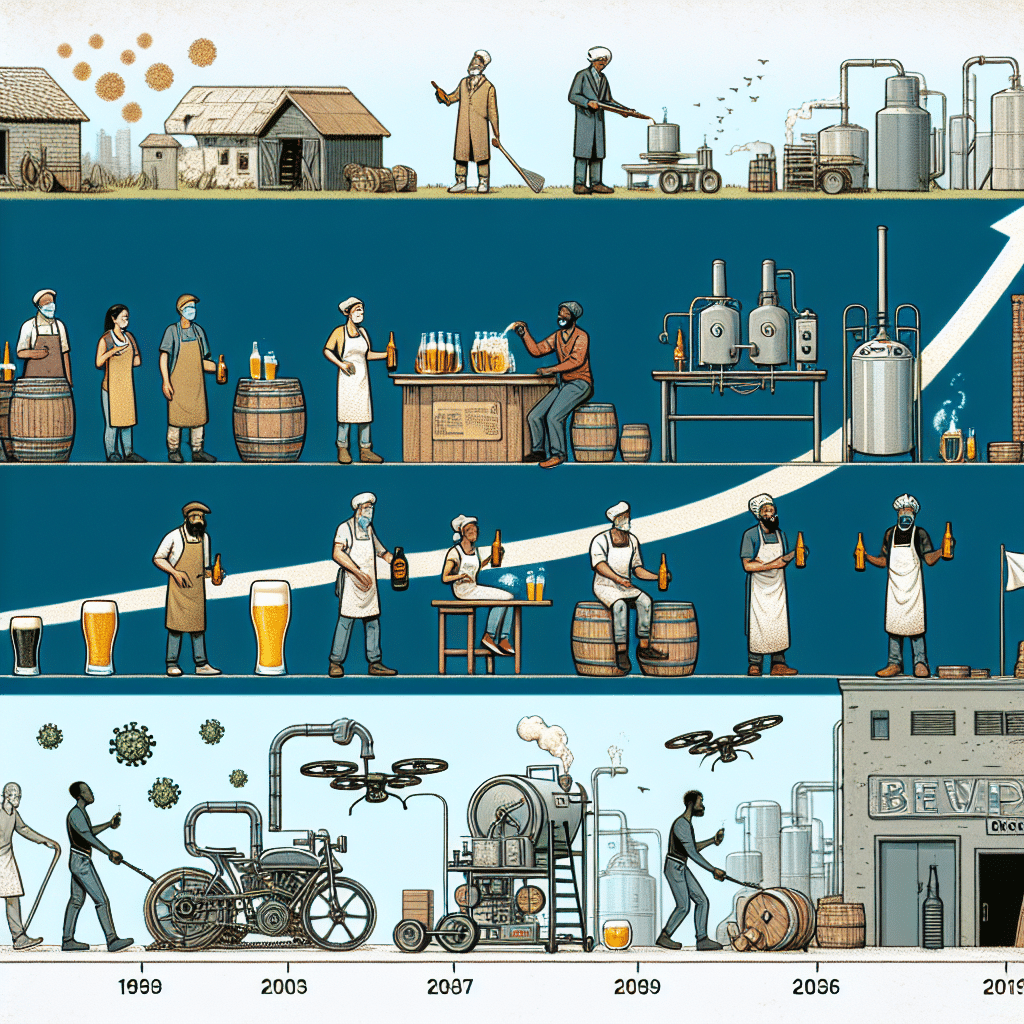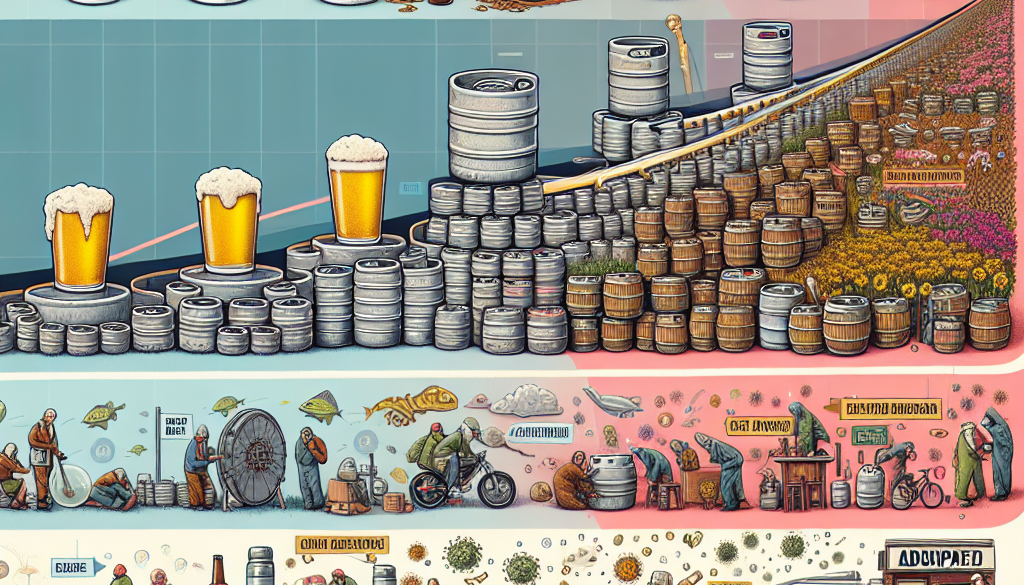Evolution in the Beer Industry Post Pandemic
-
Table of Contents
- Beer Industry Evolution Post-Pandemic: Trends and Changes
- Shifts in Consumer Preferences and Habits
- Technological Innovations and Digital Transformation
- Adaptation to New Distribution Channels
- Regulatory Changes and Government Support
- Focus on Sustainability and Social Responsibility
- Conclusion: The Resilient Beer Industry Emerges Stronger
- ETprotein: Enhancing the Beer Experience with Quality Proteins
Beer Industry Evolution Post-Pandemic: Trends and Changes

The beer industry, like many others, has faced unprecedented challenges during the COVID-19 pandemic. Lockdowns, social distancing, and the closure of bars and restaurants have forced breweries, distributors, and retailers to adapt and innovate. As the world slowly emerges from the pandemic, the beer industry is experiencing a period of evolution, marked by new consumer behaviors, technological advancements, and shifts in market dynamics. This article explores the significant changes and trends that are shaping the beer industry in the post-pandemic era.
Shifts in Consumer Preferences and Habits
One of the most notable changes in the beer industry post-pandemic is the shift in consumer preferences and drinking habits. With more people spending time at home, there has been a surge in off-premise sales, including online purchases and home delivery services. Consumers have also shown a growing interest in health and wellness, leading to an increased demand for low-alcohol, non-alcoholic, and functional beers.
- Increased demand for craft and specialty beers
- Growth in popularity of sustainable and locally sourced products
- Rise in home consumption and e-commerce sales
Technological Innovations and Digital Transformation
The pandemic has accelerated the adoption of technology in the beer industry. Breweries and retailers have turned to digital platforms to reach consumers, utilizing social media, virtual tastings, and online events to engage with their audience. Contactless payment systems, mobile ordering, and delivery apps have become the norm, streamlining the purchasing process and enhancing customer experience.
- Implementation of advanced brewing technologies for efficiency and quality control
- Use of data analytics for market insights and personalized marketing
- Development of mobile apps and virtual experiences to connect with consumers
Adaptation to New Distribution Channels
The closure of on-premise venues has forced breweries to rethink their distribution strategies. Many have shifted their focus to retail and direct-to-consumer channels, adapting packaging and product offerings to cater to at-home consumption. Subscription services and beer clubs have also gained traction, providing consumers with a convenient way to discover new beers and support local breweries.
- Expansion of direct-to-consumer sales through brewery websites and online stores
- Collaborations with retailers and third-party delivery services
- Emergence of beer subscription boxes and loyalty programs
Regulatory Changes and Government Support
Governments around the world have implemented various measures to support the beer industry during the pandemic. These include tax reliefs, grants, and changes in regulations to allow for expanded delivery and takeaway options. As the industry recovers, continued advocacy for favorable policies will be crucial for the growth and sustainability of breweries, especially small and independent ones.
- Temporary relaxation of alcohol laws to permit delivery and curbside pickup
- Financial assistance programs for affected businesses
- Advocacy for permanent changes to support industry growth
Focus on Sustainability and Social Responsibility
The pandemic has heightened awareness of environmental and social issues, leading consumers to seek out brands that align with their values. The beer industry has responded by emphasizing sustainability in their operations, from sourcing ingredients to packaging and distribution. Social responsibility initiatives, such as supporting local communities and promoting responsible drinking, have also become more prominent.
- Adoption of eco-friendly practices in brewing and packaging
- Support for local suppliers and community projects
- Efforts to promote moderation and address alcohol-related harm
Conclusion: The Resilient Beer Industry Emerges Stronger
The beer industry’s post-pandemic evolution is a testament to its resilience and ability to adapt to changing circumstances. While the pandemic has brought about significant challenges, it has also spurred innovation and growth in various areas. From shifts in consumer behavior to technological advancements and a focus on sustainability, the industry is poised to emerge stronger and more dynamic than ever before. As it continues to evolve, the key takeaways for breweries and stakeholders are to stay flexible, embrace digital transformation, and prioritize the needs and values of their consumers.
ETprotein: Enhancing the Beer Experience with Quality Proteins
In the quest for innovation and meeting consumer demands for healthier options, ETprotein’s protein products can play a vital role in the beer industry. Their high-quality organic proteins can be used to create new beer formulations that cater to health-conscious consumers, including those seeking gluten-free, non-GMO, or vegan options. ETprotein’s commitment to sustainability and quality aligns with the industry’s post-pandemic direction, making them an ideal partner for breweries looking to enhance their products and appeal to a broader market.
About ETprotein:
ETprotein, a reputable protein and L-(+)-Ergothioneine (EGT) Chinese factory manufacturer and supplier, is renowned for producing, stocking, exporting, and delivering the highest quality organic bulk vegan proteins and L-(+)-Ergothioneine. They include Organic rice protein, clear rice protein, pea protein, clear pea protein, watermelon seed protein, pumpkin seed protein, sunflower seed protein, mung bean protein, peanut protein, and L-(+)-Ergothioneine EGT Pharmaceutical grade, L-(+)-Ergothioneine EGT food grade, L-(+)-Ergothioneine EGT cosmetic grade, L-(+)-Ergothioneine EGT reference grade and L-(+)-Ergothioneine EGT standard. Their offerings, characterized by a neutral taste, non-GMO, allergen-free attributes, with L-(+)-Ergothioneine purity over 98%, 99%, cater to a diverse range of industries. They serve nutraceutical, pharmaceutical, cosmeceutical, veterinary, as well as food and beverage finished product distributors, traders, and manufacturers across Europe, USA, Canada, Australia, Thailand, Japan, Korea, Brazil, and Chile, among others.
ETprotein specialization includes exporting and delivering tailor-made protein powder and finished nutritional supplements. Their extensive product range covers sectors like Food and Beverage, Sports Nutrition, Weight Management, Dietary Supplements, Health and Wellness Products, and Infant Formula, ensuring comprehensive solutions to meet all your protein needs.
As a trusted company by leading global food and beverage brands and Fortune 500 companies, ETprotein reinforces China’s reputation in the global arena. For more information or to sample their products, please contact them and email sales(at)ETprotein.com today.














